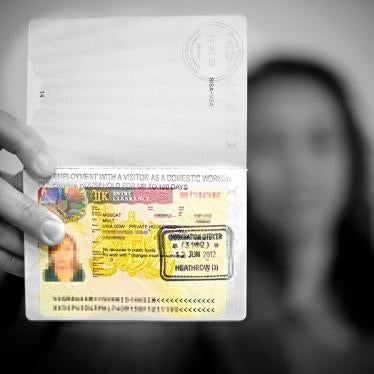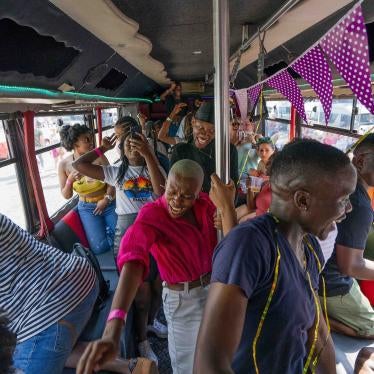Forced labour, human trafficking, and other forms of modern-day exploitation may seem distant from the lives of ordinary Europeans celebrating Labour Day with a spring holiday.
These abuses are often seen as a scourge of countries beset with poverty, corruption, and crime.
Yet the International Labour Organization (ILO) estimates that 880,000 women, men, and children are victims of forced labour in the European Union.
Many are migrants, but few would guess that the majority of reported forced labour victims are EU citizens who have migrated between member states. The ILO has found cases of domestic servitude in almost all Western European countries. In March, Human Rights Watch issued a report documenting forced labour of migrant domestic workers in the United Kingdom.
The reality of forced labour in the EU is not the whole picture, though.
Almost 21 million people globally are trapped in forced labour, and globalisation has meant that it is hard to know whether the clothes, electronics and toys you buy were made by workers trapped in exploitative and violent conditions abroad.
Indeed, football fans should know that Nepalese and Indian migrant construction workers overhauling Qatar's infrastructure in preparation for the 2022 World Cup are often cheated by recruiters, weighed down by onerous debts, subjected to exploitative laws and policies, and subjected to hazardous working conditions such as labouring in the hot desert sun. Hundreds have already died.
Workers elsewhere in the Gulf states are treated just as poorly.
Forced labour is a human rights issue. But it also carries huge financial costs. The ILO estimates that workers in forced labour lose about $21 billion in wages each year, and those exacting forced labour make $44 billion in illegal profits. States lose billions in tax income and social security contributions.
European countries have taken a leadership role in setting up regional mechanisms to protect human rights. So it is a puzzle why some European countries are reticent to take a strong stand on improving global standards to prevent forced labour and protect and compensate victims.
Governments, trade unions, and employers' groups will meet in Geneva in June to negotiate supplementary standards to ILO Convention 29 on Forced Labour, one of the most important treaties in international labour law.
This treaty – ratified by 177 countries, including all of Europe – and its definition of forced labour have played an influential role in shaping national and international standards.
However, many provisions of the 1930 treaty are outdated, such as those originally aimed at overseas colonies.
The June negotiations aim to modernise and strengthen the convention to fill gaps in prevention, victim protection, and compensation.
They will also create measures to address contemporary patterns: an estimated 90 percent of forced labour takes place in the private economy, including in homes, local businesses, and multinational supply chains. The proposed standards outline the need for concrete national action plans and international cooperation.
ILO members will vote on whether these new supplementary standards should be a legally binding protocol that countries could ratify or a non-binding recommendation. In their preliminary indications of their positions, Austria, Finland, France, Germany, Greece, Poland, Portugal and Slovenia among EU countries have expressed support for a legally binding protocol.
However nine EU countries have said they prefer a non-binding recommendation, in some cases citing concern about a lengthy ratification process.
They are: Cyprus, Estonia, Latvia, Lithuania, Netherlands, Slovakia, Spain, Sweden, and the United Kingdom.
It is puzzling why any EU government would not support the strongest possible outcome. The gravity and scale of forced labour demands effective obligations to act, not just voluntary guidelines.
The proposed draft falls within obligations these countries already hold under the 2011 EU Trafficking directive, the EU charter of fundamental rights under EU law, and as parties to the Council of Europe Trafficking Convention.
By supporting a strong, legally binding protocol, EU governments would not take on new obligations, but instead would ensure a baseline of minimum standards globally – a critical advance in an increasingly interconnected world.
As a step toward ending exploitation and bondage across the globe, every European government should vote for a legally binding protocol with comprehensive protections to modernize the ILO Forced Labour Convention, and move quickly to ratify and enforce it.







